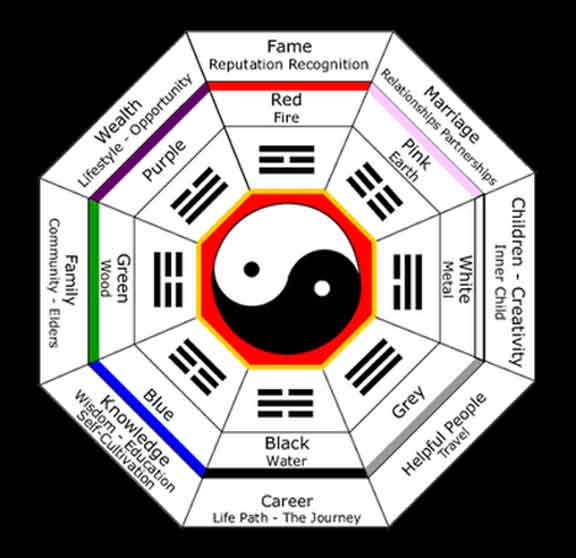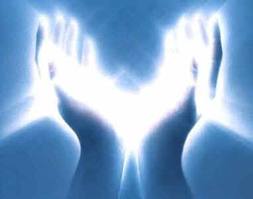INTRODUCTION TO FENG SHUI
“Feng” means “wind” and “shui” means “water” in Chinese, therefore, the term Feng Shui literally translates as “wind-water” in English. The ancient Chinese were at the mercy of the fury of the natural forces of wind and water as their land was often affected by strong mountain winds and their plains were prone to flooding. As a result, Gentle wind and Clear water became associated with good harvest and good health. Thus “good feng shui” came to mean good livelihood and fortune, while “bad Feng Shui” came to mean hardship and misfortune. Therefore, before the construction of their dwellings, wind and water considerations were made. These guidelines for buildings put together came to be known as the science of Feng Shui.

The science of Feng Shui was developed to guide people on the right positioning and direction of buildings so that they were protected from the adverse effects of wind and water and benefited from the proper flow of air (wind) and proper placement of water sources.
Skylight windows have both advantages and disadvantages which make them suitable only in some places. As an Architect, I have described Skylight windows under the following headings so that you can decide whether it is suited for your requirement and your space:
What is Feng Shui?
What is Chi?
Is Feng Shui similar to Vastu Shastra?
Is Feng Shui a superstition?
WHAT IS FENG SHUI?
Feng Shui (pronounced fung-shway in Mandarin or fung-shooy) also known as “Kanyu” is an ancient Chinese science developed over 3000 years ago. It is a complex body of knowledge that explains the art of placing and positioning a building so that it is in harmony with its surroundings and the art of balancing the energies of the space to ensure that the people inhabiting it, are exposed to positive “Chi” or energy, which in turn is believed to ensure good health and good fortune. The science of Feng Shui takes into account Astronomy, Astrology, the forces of nature, the magnetic field and how it influences man, geography and environmental factors which influence buildings internally and externally.
WHAT IS “CHI”?
‘Chi’ is the mythical dragon’s celestial breath and means the life force that governs our world. According to Feng Shui, positive ‘Chi’ brings happiness, prosperity, luck and long life. Chi is found everywhere but is constantly in a state of flux because of which we are constantly changing though we are unaware of it. This change is essential for out mental, physical and spiritual health because if there is no change there is stagnation.Though Chi is present everywhere, it is concentrated in some areas. Feng Shui studies the distribution and movement of ‘chi’ and helps to balance the energies and channel positive ‘Chi’ in a building.
is the mythical dragon’s celestial breath and means the life force that governs our world. According to Feng Shui, positive ‘Chi’ brings happiness, prosperity, luck and long life. Chi is found everywhere but is constantly in a state of flux because of which we are constantly changing though we are unaware of it. This change is essential for out mental, physical and spiritual health because if there is no change there is stagnation.Though Chi is present everywhere, it is concentrated in some areas. Feng Shui studies the distribution and movement of ‘chi’ and helps to balance the energies and channel positive ‘Chi’ in a building.
IS FENG SHUI SIMILAR TO VASTU SHASTRA?
Although Feng Shui is conceptually similar to its Indian counterpart “Vastu Shastra“ in that, they both try to harmonize the flow of life-energy (“Chi” in Feng Shui or “Prana” in Vastu) through the house, it differs in the details, such as the exact directions in which various objects, rooms, materials etc. are to be placed. This could be because of the geographical differences between China (where Feng shui originated) and India (where Vastu Shastra was developed). In Europe a similar science known as “Geomancy” was practised. Native Americans and Hawaiians have their own form of this science.
IS FENG SHUI A SUPERSTITION?
T oday, Feng Shui is practiced not only by the Chinese, but also by Westerners as well as other Asians. It has become a New Age fad in the western world, with rich people hiring ‘masters of Feng Shui’ for hefty fees, to suggest ways of deflecting negative energy. However, the hiring of an expert, the great altering of architecture or design, and the moving from place to place that is sometimes necessary for the effectiveness of Feng Shui, requires a lot of money. Because of this, some people who cannot afford it, are skeptical about Feng Shui, saying that it is only for the wealthy. Moreover, much of the knowledge behind it has been lost in translation. Also,the arrays of metaphysical products like forks, mirrors, etc. offered for sale to help improve your health, maximize your potential and guarantee fulfillment have only established it as a scam. As a result it is frowned upon or scorned and considered a Superstiton by many, today.
oday, Feng Shui is practiced not only by the Chinese, but also by Westerners as well as other Asians. It has become a New Age fad in the western world, with rich people hiring ‘masters of Feng Shui’ for hefty fees, to suggest ways of deflecting negative energy. However, the hiring of an expert, the great altering of architecture or design, and the moving from place to place that is sometimes necessary for the effectiveness of Feng Shui, requires a lot of money. Because of this, some people who cannot afford it, are skeptical about Feng Shui, saying that it is only for the wealthy. Moreover, much of the knowledge behind it has been lost in translation. Also,the arrays of metaphysical products like forks, mirrors, etc. offered for sale to help improve your health, maximize your potential and guarantee fulfillment have only established it as a scam. As a result it is frowned upon or scorned and considered a Superstiton by many, today.
However, I believe that Feng Shui, just like Vastu Shastra, is a Science that has survived the test of time and is based on sound scientific principles. The very fact that people have experienced positive effects in their lives by scientifically applying the principles of Feng shui, indicates that it is a Science and not a superstition.
In the topics below, I intend to address the principles of Feng Shui. I shall also bring out the similarities between Feng Shui (which was practised in China) and that was developed thousands of years ago and has only because there is Vastu Shastra (which was developed in India) so that you are convinced that these two are ‘sciences’ were developed by the two great civilisations of ancient times, separately, but with one aim – to channelize positive energy in a building so as to improve the inhabitant’s health, success and good fortune.
In this post, you have been introduced to the concept of “Chi”. To understand the importance of Chi in Feng Shui design and differentiate between good and bad Chi, go to:
Related Topics:
- Feng Shui
- Feng Shui Principles
- Feng Shui Principles Applied To A Proposed Building
- Feng Shui Principles Applied To An Existing Building
If you found this post useful, all it takes is a simple click on the “pin it” “like,” “share,” “tweet,” or Google+ buttons below the post.




